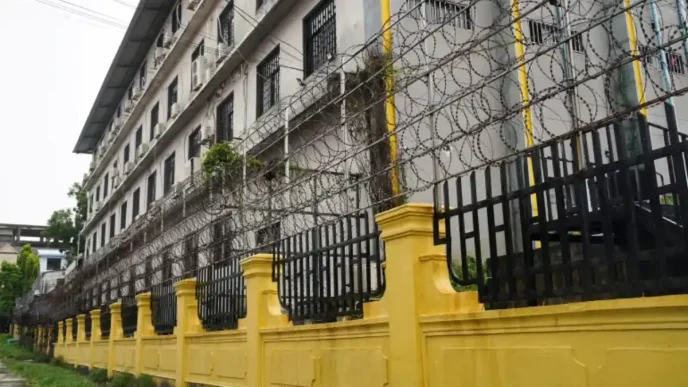In a developing story that has drawn international attention, the Philippine government has pledged legal assistance to 20 Filipino seafarers aboard a cargo vessel discovered with two tons of suspected cocaine in South Korea. The incident, unfolding in the port of Okgye, raises complex questions about maritime security, international drug trafficking networks, and the protection of migrant workers caught in legal crosshairs. As investigations continue, the Department of Migrant Workers (DMW) is stepping in to ensure the crew’s rights are upheld, even as their potential involvement remains unclear.
Vessel Intercepted in South Korea
On April 4, 2025, the MV Lunita, a cargo ship carrying 20 Filipino crew members including the captain, docked in Okgye, a port in South Korea’s Gangwon Province. During a routine inspection by local authorities, over 50 boxes of suspected cocaine were uncovered in a hidden compartment within the ship’s engine room. The vessel’s journey had taken it from Mexico through Ecuador, Panama, and China before arriving in South Korea, a route that has raised suspicions among investigators about the origins and intended destination of the drugs.
Migrant Workers Secretary Hans Leo Cacdac confirmed the discovery in a statement on April 8, emphasizing that the Philippine government is prioritizing the welfare of its citizens. “This is already included in the investigation—who may be involved, if any of the crew members are included, what the details are, where they were or their locations, and the involvement of each crew member on board” he told GMA’s Unang Balita. He added, “But as of now, of course, they are entitled to their defense, to be presumed innocent. We are providing the necessary legal counsel in tandem with the one provided by the ship owner.”
Government and Company Response
The DMW has swiftly moved to coordinate with the Department of Foreign Affairs (DFA) and South Korean authorities to address the situation. Legal representation for the Filipino crew has been arranged, with additional support from JJ Ugland Companies, the ship’s operator, which has also dispatched a lawyer to assist. This dual approach underscores the urgency of ensuring fair treatment for the seafarers, who are now entangled in a high-stakes international drug probe.
While no formal charges have been announced against the Filipino crew as of the latest updates, the investigation is ongoing. South Korean authorities, known for their stringent anti-drug policies, are working to determine the extent of the crew’s knowledge or involvement, if any. The Philippine government’s stance remains clear: the seafarers are to be presumed innocent until proven otherwise, and their rights must be protected throughout the legal process.
Broader Context of Filipino Migrant Workers
This incident casts a spotlight on the vulnerabilities faced by Filipino migrant workers, particularly those in the maritime sector. The Philippines is one of the world’s largest suppliers of seafarers, with over 400,000 Filipinos employed on vessels globally, according to data from the Philippine Overseas Employment Administration (POEA). These workers are often hailed as “modern-day heroes” for their significant contributions to the national economy through remittances, which amounted to over US$30 billion in 2023.
However, their work comes with substantial risks. Seafarers frequently operate in isolated, high-pressure environments, navigating complex international waters where they may unknowingly become entangled in illicit activities. Past cases, such as the 2019 detention of Filipino crew members in Turkey on drug-related suspicions—later cleared of charges—highlight the precarious nature of their profession. The current situation in South Korea serves as a stark reminder of the need for robust legal protections and international cooperation to safeguard these workers.
International Drug Trafficking Concerns
The discovery of two tons of suspected cocaine aboard the MV Lunita also raises broader concerns about the role of maritime routes in global drug trafficking. East Asia, while not traditionally a primary hub for cocaine distribution, has seen an uptick in seizures in recent years as cartels exploit shipping lanes to reach new markets. South Korea, with its advanced port infrastructure and strategic location, has become an occasional transit point, though local consumption remains low compared to regions like North America or Europe.
The ship’s itinerary—from Mexico, a known hub for cocaine production, through multiple ports before reaching South Korea—suggests a sophisticated operation. If confirmed, this seizure could represent one of the largest cocaine hauls in South Korea’s recent history, prompting questions about how such a significant quantity evaded detection across multiple jurisdictions. Analysts suggest that the case may spur renewed calls for enhanced maritime security protocols and intelligence-sharing among nations along key shipping routes.
Legal and Diplomatic Implications
For the Filipino seafarers, the legal implications of this incident are profound. South Korea’s drug laws are notoriously strict, with penalties for trafficking including lengthy prison sentences or, in extreme cases, the death penalty, though the latter is rarely enforced. Even if the crew members are found to have no direct involvement, the investigation process could result in prolonged detention, straining their personal and financial resources.
Diplomatically, the case tests the Philippines’ relationship with South Korea, a key economic partner. Bilateral ties have strengthened in recent years through trade agreements and labor migration programs, with thousands of Filipinos working in South Korea across various sectors. The Philippine government’s proactive response—ensuring legal aid and close coordination with local authorities—signals an intent to maintain cordial relations while advocating for its citizens. However, any missteps in handling the case could complicate matters, particularly if public sentiment in either country shifts.
Human Stories Behind the Headlines
Beyond the legal and geopolitical dimensions, the plight of the 20 Filipino seafarers aboard the MV Lunita is, at its core, a human story. Many of these workers likely left their families in the Philippines to seek better opportunities abroad, driven by economic necessity. The uncertainty of their current situation—detained in a foreign country, facing potential criminal allegations—adds immense stress to their already challenging lives.
Advocacy groups for migrant workers have called for transparency in the investigation and urged both the Philippine and South Korean governments to prioritize the crew’s well-being. Stories of Filipino seafarers enduring hardship abroad often resonate deeply with the public back home, where their sacrifices are widely acknowledged. As one labor rights activist noted in a recent interview with a local outlet, “These workers are not just statistics; they are fathers, brothers, and sons who deserve fairness and compassion.”
Looking Ahead
As the investigation into the MV Lunita unfolds, several questions remain unanswered. Will the Filipino seafarers be cleared of any involvement, or will evidence emerge implicating some or all of the crew? How will this incident shape future policies on maritime security and the protection of migrant workers? For now, the Philippine government’s commitment to providing legal assistance offers a measure of reassurance, but the road ahead for these 20 individuals is uncertain.
In the broader fight against international drug trafficking, this case may serve as a catalyst for stronger regional cooperation. Yet, at the heart of the story are the Filipino seafarers, whose fates hang in the balance as two nations navigate the complexities of law, diplomacy, and justice. Their story is a poignant reminder of the human cost of global challenges, and one that will likely resonate for months to come.














